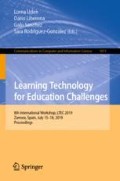Abstract
The aim of this article is to highlight the benefits of implementing an active learning methodology in classes delivered to engineering degree students in Spain. The proposed teaching methodology has been designed for subjects with assessable practices and a high number of students in Computer Engineering degrees. The methodology is based on the redefinition of roles in the work assessment process where collaborative learning methods are incorporated. The idea of this approach is that students work closely together to learn from each other and that they are responsible for their own learning and that of fellow classmates. Moreover, they learn from participating in the process of assessing the work of their peers. This research describes the implementation of this technology and its promising results. Students increase their activity because they assume the role of solver of the proposed assignment in pair programming and also as evaluator of those of others due peers’ protocol. The proposed methodology gives them a more enriching understanding of the contents of the subjects as well as the need for greater intensity in the acquisition of such knowledge in the subject.
Access this chapter
Tax calculation will be finalised at checkout
Purchases are for personal use only
References
Ben-Ari, M.: Constructivism in computer science education. J. Comput. Math. Sci. Teach. 20(1), 45 (2001)
Blumenfeld, P.C., et al.: Motivating project-based learning: sustaining the doing, supporting the learning. Educ. Psychol. 26(3–4), 369–398 (1991)
Boud, D., Cohen, R., Sampson, J.: Peer learning and assessment. Assess. Assess. High. Educ. 24(4), 413–426 (1999)
Braught, G., Tim, W., Eby, L.M.: The case for pair programming in the computer science classroom. ACM Trans. Comput. Educ. 11(1), 21 (2011)
Dybå, T., Arisholm, E., Sjøberg, D.I., Hannay, J.E., Shull, F.: Are two heads better than one? On the effectiveness of pair programming. IEEE Softw. 24(6), 12–15 (2007)
Fruchter, R.: Dimensions of teamwork education. Int. J. Eng. Educ. 17(4/5), 426–430 (2001)
Greening, T.: Emerging constructivist forces in computer science education: shaping a new future. In: Greening, T. (ed.) Computer Science Education in the 21st Century, pp. 47–80. Springer, New York (2000). https://doi.org/10.1007/978-1-4612-1298-0_5
Hsiung, C.M.: The effectiveness of cooperative learning. J. Eng. Educ. 101(1), 119–137 (2012)
Kalliath, T., Laiken, M.: Use of teams in management education. J. Manag. Educ. 30(6), 747–750 (2006)
Marin-Garcia, J.A., Lloret, J.: Improving teamwork with university engineering students. The effect of an assessment method to prevent shirking. WSEAS Trans. Adv. Eng. Educ. 5(1), 1–11 (2008)
Slavin, R.E.: Using Student Team Learning. Baltimore, MD: Johns Hopkins University. Center for Social Organization of Schools (1994)
Slavin, R.E.: Cooperative Learning: Theory, Research, and Practice. Prentice-Hall, Englewood Cliffs (1990)
Yazedjian, A., Kolkhorst, B.B.: Implementing small-group activities in large lecture classes. Coll. Teach. 55(4), 164–169 (2007)
Acknowledgments
This work was carried out under the partial frame of the innovation project ID10/147, supported by University of Salamanca.
Author information
Authors and Affiliations
Corresponding author
Editor information
Editors and Affiliations
Rights and permissions
Copyright information
© 2019 Springer Nature Switzerland AG
About this paper
Cite this paper
Gil-González, A.B., de Luis Reboredo, A., González, S.R., de la Prieta Pintado, F. (2019). A Teaching-Learning Model of Collaborative Assessment in Computer Engineering Studies. In: Uden, L., Liberona, D., Sanchez, G., Rodríguez-González, S. (eds) Learning Technology for Education Challenges. LTEC 2019. Communications in Computer and Information Science, vol 1011. Springer, Cham. https://doi.org/10.1007/978-3-030-20798-4_36
Download citation
DOI: https://doi.org/10.1007/978-3-030-20798-4_36
Published:
Publisher Name: Springer, Cham
Print ISBN: 978-3-030-20797-7
Online ISBN: 978-3-030-20798-4
eBook Packages: Computer ScienceComputer Science (R0)

